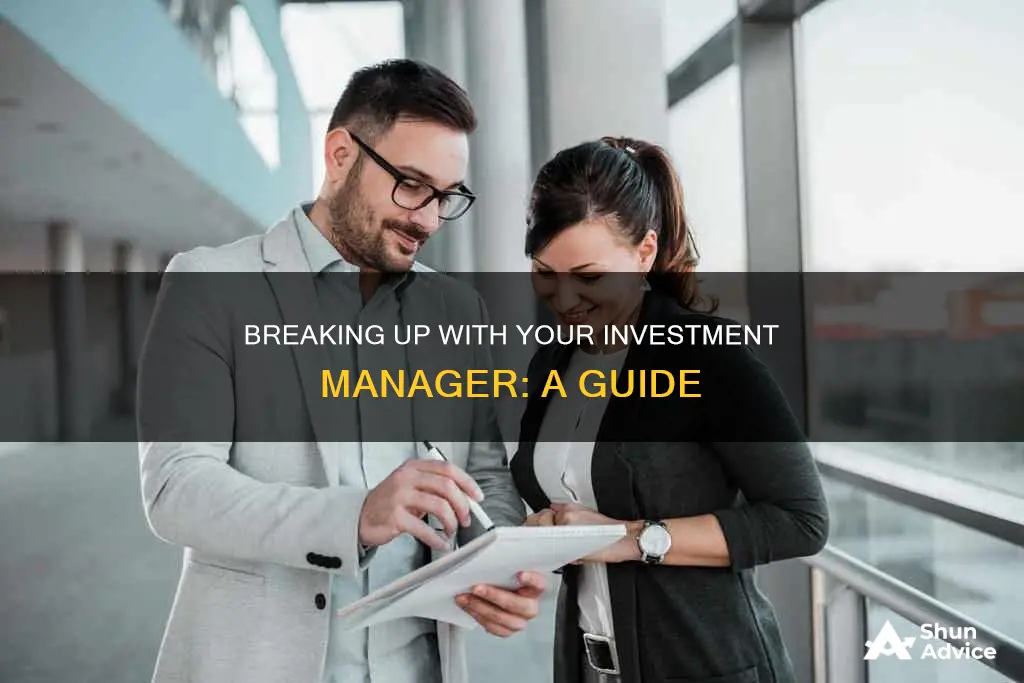
Breaking up with your investment manager can be a difficult and uncomfortable process, but it is sometimes necessary. There are many reasons why you might want to end your relationship with your investment manager, including a lack of trust, poor performance, or a simple mismatch of personalities. Before you end the relationship, it is important to reflect on what may be going wrong and consider discussing it with your investment manager, as the situation could be resolved by having an open conversation. If you are sure that you want to end the relationship, there are several steps you can take to ensure a clean break, including reviewing your contract, deciding on your next steps, requesting a copy of your investment records, and formally ending the relationship.
| Characteristics | Values |
|---|---|
| Review contract | Check for termination policy, fees, and instructions |
| Communicate with advisor | Be clear and concise, and explain your reasons for leaving |
| Decide on next steps | Choose a new investment manager or opt for self-management |
| Request records | Ask for a copy of your investment records |
| Terminate relationship | Provide a signed letter or email |
What You'll Learn

Review your contract
Reviewing your contract is a crucial step when ending a relationship with an investment manager. Here are some detailed instructions and considerations to keep in mind:
Identify the Contract
First, locate your contract or letter of engagement. You likely signed this agreement when you initially hired your investment manager. If you cannot find the contract, don't hesitate to reach out to your investment manager or their administrative assistant to request a copy. Having a clear understanding of the terms and conditions outlined in the contract is essential before taking the next steps.
Understand Termination Clauses
Once you have the contract, carefully review it to identify any clauses or sections pertaining to terminating the relationship. These clauses will outline the specific steps you need to take to end the contract. For example, you may be required to provide a signed letter formally terminating the relationship. Pay close attention to any specified notice period, such as 30 days' notice, to ensure you fulfil your contractual obligations.
Fees and Penalties
Another critical aspect to consider is the financial implications of ending the contract. Review the contract to understand any termination fees, penalties, or other charges associated with ending the relationship. These fees could be charged by the investment manager, the investment funds, or both. Be mindful of any annual fixed fees you may be liable for and whether there is an option to pay a penalty to exit early. Understanding these financial implications will help you make an informed decision and prepare financially for the transition.
Transition Planning
As you review the contract, consider your next steps for managing your investments. You may choose to start managing your accounts independently or hire a new investment manager. If you opt for a new investment manager, they can assist in managing the transition and transferring your portfolio. However, if you decide to manage your investments yourself, start organising the necessary paperwork for moving your investments to a new brokerage. Understanding your options and having a plan in place will make the transition smoother.
Act on the Contractual Requirements
After thoroughly reviewing and understanding the contract, it's time to act on the requirements outlined in the termination clauses. Follow the specified steps, provide any required notices or letters, and be mindful of the timelines. By adhering to the contractual obligations, you ensure a smooth and professional transition.
Remember, reviewing the contract is a crucial step in ending your relationship with your investment manager. It empowers you to understand your rights, obligations, and financial implications, enabling you to make informed decisions and facilitate a seamless transition to your next chapter of investment management.
Understanding Your Investment Portfolio Reports: Why They Matter
You may want to see also

Decide on your next steps
The first step in deciding on your next steps is to review your contract with your investment manager. This will help you understand the exit process and any associated fees. For example, you may be liable for annual fixed fees or there may be a termination fee. Knowing what steps you need to take and what fees are involved will help you make an informed decision about your next steps.
Once you understand the terms of your contract, you can start planning for the future. You have a few options to consider. One option is to start managing your own accounts. However, this may be challenging as most people lack the expertise of wealth advisors in managing market uncertainty, estate planning, retirement planning, and tax strategies. Another option is to hire a new investment manager. A financial advisor can help manage the process of firing your current advisor and transferring your portfolio. They will also be able to advise you on market uncertainty, estate planning, retirement planning, and tax strategies.
If you decide to hire a new investment manager, it is important to evaluate your options carefully. Consider the firm's credentials, fees, conflicts of interest, and standard of care. Ask tough questions and don't be afraid to ask for references. You should also consider the working relationship and whether the advisor is a good fit for your personality and expertise requirements.
If you decide to manage your own investments, there are a few things to keep in mind. First, make sure you have all the necessary paperwork in order to move your investments to a new brokerage. Second, be prepared for market uncertainty and have a plan for how you will manage your investments through ups and downs. Finally, stay up-to-date on estate planning, retirement planning, and tax strategies to ensure you are making the most of your investments.
Remember, it's your money and your future. Don't stay in a bad financial relationship just to avoid an awkward breakup. Do what is best for your financial goals and don't be afraid to make a change if your current investment manager is not meeting your needs.
Investing Young: My Journey to 300k Before 30
You may want to see also

Request investment records
When ending a relationship with an investment manager, it is important to review your contract and make a plan for the future. As part of this process, you should request a copy of your investment records. Here is a detailed, step-by-step guide on how to do this:
Step 1: Review Your Contract
Your contract with your investment manager will contain important information about the exit process and any associated fees. Reviewing this document will help you understand the steps you need to take and the costs involved. For example, you may be liable for annual fixed fees or there may be an option to pay a penalty to exit early. Understanding these details upfront will enable you to make informed decisions and prepare for the next steps.
Step 2: Make a Plan for the Future
Before taking any further action, it is important to decide how you will manage your wealth and investments going forward. You have two main options: managing your accounts yourself or hiring a new advisor. If you choose to manage your own accounts, be aware that this comes with its own set of challenges and may require expertise in areas such as market uncertainty, estate planning, retirement planning, and tax strategies. Alternatively, hiring a new advisor can provide you with expert guidance and support during this transition. They can also help manage the process of transferring your portfolio.
Step 3: Request Investment Records
Once you have a plan in place, it is time to request a copy of your investment records. Custodians are legally required to transfer their clients' security historical records. These records contain valuable information about your investing history and are essential for tax purposes. Most investment firms provide investors with access to their full transaction history through a password-protected account on their website. Be sure to download and securely store this information before you lose access to the site. Remember to also request records of the cost basis of taxable securities, as this information is required for tax reporting.
Step 4: Understand Recordkeeping
It is important to organize and maintain your investment records efficiently. This includes saving key records, either as hard copies or digital files, and reviewing and managing your account information regularly. By doing so, you can ensure that your funds are invested according to your instructions and that there are no unauthorized transactions or withdrawals. Additionally, keeping good records can provide a performance history of your investments and simplify the process of preparing tax returns. It is recommended to perform an annual review of your records, discarding any unnecessary documents and safely storing those that are still relevant.
Investment Manager: Licenses Required to Manage Money
You may want to see also

Communicate the end date
Communicating the end date of your relationship with your investment manager is a crucial step in the termination process. Here are some detailed instructions on how to effectively convey the end date to your investment manager:
Review Your Contract:
Before communicating the end date, carefully review your contract with the investment manager. This contract will outline the specific steps required to terminate the relationship and any associated fees. Understanding these terms will help you navigate the process smoothly.
Choose a New Investment Manager (Optional):
If you plan to transition to a new investment manager, it is advisable to make this decision before informing your current manager of the end date. This will allow the new manager to facilitate a seamless transition and handle the transfer of your assets. However, if you prefer to manage your investments independently, you can certainly do so.
Inform Your Current Investment Manager:
Once you are clear on the terms of your contract and have decided on your next steps, it's time to inform your current investment manager of the end date. You can do this through a brief conversation, followed by a formal letter or email. During the conversation, politely express your intention to part ways and provide a concise explanation. Remember, you don't owe them a lengthy justification. A simple and professional approach is best. For example, you can say something like, "I appreciate your help over the years, but I've decided to move my accounts to another advisor that better aligns with my financial goals as of [end date]. You will be receiving the transfer requests shortly."
Specify the End Date:
When communicating the end date, be clear and specific. Provide an exact date or timeframe by which you intend to conclude the relationship and initiate the transfer of your investments. This will help ensure a timely and efficient transition.
Keep Emotions in Check:
Ending a professional relationship can be challenging, but it's important to remain focused on your financial goals. Remind yourself of the reasons behind your decision and keep your emotions in check during the process. Remember, this is a business decision, and it's essential to maintain a professional tone in your communications.
Prepare for Pushback:
Be prepared for your current investment manager to try to retain your business. They may attempt to convince you to stay or ask for more time. Stay firm and let them know that your decision is final. If necessary, you can politely decline their requests and reiterate that you are just informing them of a decision that has already been made.
By following these steps, you can effectively communicate the end date to your investment manager and initiate a smooth transition to your new financial arrangement. Remember, it's your money and your future, so don't hesitate to make decisions that align with your financial aspirations.
Investment Managers and Commission: Who Benefits?
You may want to see also

Find a new advisor
Finding a new investment advisor is an important step in ending your relationship with your current investment manager. Here are some detailed steps to help you through the process:
Understand your needs and goals:
Before you begin your search for a new advisor, take some time to reflect on your financial goals and priorities. Are you looking for someone who can help you with retirement planning, tax strategies, or estate planning? Do you want an advisor who follows a specific investment philosophy or specializes in certain financial products? Knowing what you want will help you find an advisor who is well-suited to meet your needs.
Evaluate potential advisors:
When considering potential advisors, look for professionals who are qualified, experienced, and trustworthy. Evaluate their education, industry certifications, and areas of expertise. It is also essential to understand their fee structure and potential conflicts of interest. Ask if they are a fiduciary, which means they are legally bound to act in your best interest. You can also ask for references and check their reviews from other clients.
Interview candidates:
Once you have identified a few potential candidates, reach out and schedule interviews. This is your opportunity to discuss your financial goals, concerns, and expectations. Prepare a list of questions to ask, such as their investment philosophy, qualifications, fees, and the frequency of meetings or communications. A good advisor will be able to articulate their value proposition and demonstrate how they can help you achieve your financial goals.
Make your decision:
After the interviews, trust your instincts and choose an advisor who you believe is the best fit for you. Consider both their expertise and your comfort level in communicating with them. A strong rapport and shared understanding are crucial for a successful, long-term partnership. Remember, you can always switch advisors if you feel that your needs are not being met or if your financial situation changes.
Initiate the transition:
Once you have decided on a new advisor, they can help facilitate the transition. They will guide you through the process of transferring your accounts and investments. If there are any issues with your current advisor, your new advisor can handle the uncomfortable part of firing them. This includes signing any necessary forms and managing the transfer of your assets.
Remember, finding a new investment advisor is an important decision that can impact your financial future. Take your time, do your research, and don't be afraid to ask questions. It's your money and your future, so choose an advisor who understands and values your financial goals.
Monthly or Annually: Which Investing Strategy Wins?
You may want to see also
Frequently asked questions
There are several signs that it might be time to end your relationship with your investment manager/financial advisor. These include a lack of trust, poor communication, a feeling of being taken for granted, a focus on earning commissions, and a lack of transparency around fees.
Before ending the relationship, it's important to review your contract, decide on your next steps, and request a copy of your investment records. It's also a good idea to assess what went wrong and what you're looking for in a new advisor.
Refer to your contract for specific instructions on how to terminate the relationship. Typically, you will need to provide a signed letter or email confirming the end of the relationship. Keep the communication brief and professional, and don't feel obliged to give a lengthy explanation.
If you have a new advisor, they will handle the account transfer process, which usually takes around 7-10 business days. If you plan to manage your finances yourself, start by organizing all the necessary paperwork for transferring your investments to a new brokerage.







